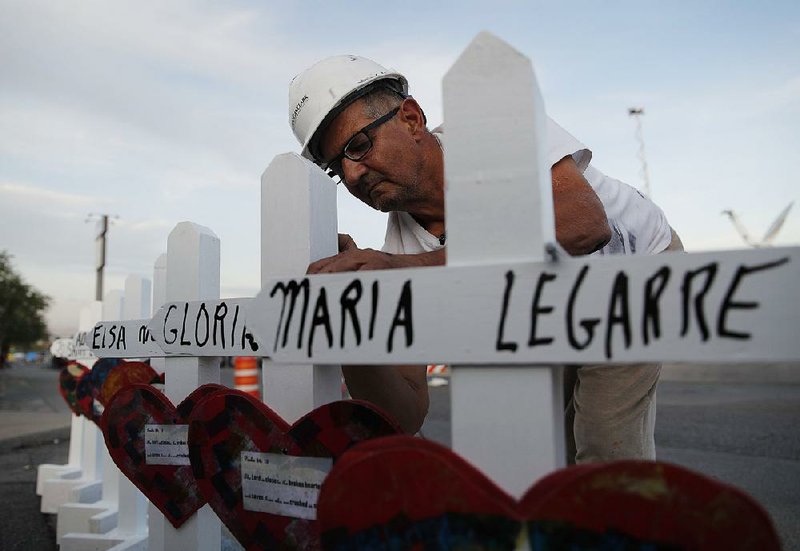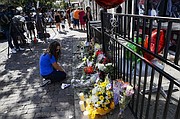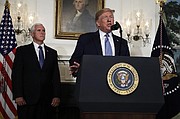WASHINGTON -- President Donald Trump on Monday denounced white supremacy in the wake of twin mass shootings over the weekend and, citing the threat of "racist hate," summoned the nation to address what he called a link between the recent carnage and violent video games, mental illness and Internet bigotry.
He stopped short of broad gun-control measures such as tougher background checks for gun buyers and the banning of some weapons and accessories such as high-capacity magazines. He also did not address claims by Democratic presidential rivals and others that his own rhetoric has contributed to a national climate that played a role in the shootings.
"In one voice, our nation must condemn racism, bigotry and white supremacy," Trump said at the White House. "Hatred warps the mind, ravages the heart and devours the soul."
Speaking at a lectern beneath a portrait of George Washington in the Diplomatic Reception Room, Trump denounced the anti-Hispanic manifesto of the suspect in the El Paso, Texas, shooting, which killed 22 people, as part of an "evil contagion" spreading online.
"These barbaric slaughters are an assault upon our communities, an attack upon our nation and a crime against all of humanity," Trump said of the massacre in El Paso on Saturday and another in Dayton, Ohio, on Sunday -- at one point incorrectly referring to Toledo as the site of those killings. It followed an error made by former Vice President Joe Biden on Sunday evening, when he described shootings in "Houston" and "Michigan" before correcting himself.
[Video not showing up above? Click here to watch » https://www.youtube.com/watch?v=fFgMNdvCoTA]
Between the two shootings, 31 victims have now died.
Trump, who will visit Dayton and El Paso on Wednesday, took no questions. He also did not repeat his call on Twitter earlier in the morning for Republicans and Democrats to work together to strengthen background checks for prospective gun buyers.
That angered Democratic leaders in Congress, who quickly accused Trump of retreating from more substantive action on gun control under political pressure.
"It took less than three hours for the president to back off his call for stronger background-check legislation," House Speaker Nancy Pelosi of California and Sen. Charles Schumer of New York, the Democratic leader, said in a statement.
VOTE ON BILL URGED
Schumer said Senate Majority Leader Mitch McConnell is blocking gun safety measures that more than 90% of Americans support and, with Pelosi, urged the Republican from Kentucky to call the Senate into emergency session to take immediate action on a House-passed bill. That measure would require federal background checks for all firearms sales and transfers, including those sold online or at gun shows.
Another bill would allow an expanded 10-day review for gun purchases.
Even some Republicans called Monday for that legislative blockade to end. Sens. Susan Collins of Maine, Mike Braun of Indiana and Patrick Toomey of Pennsylvania all said the background-checks bill should be brought to a vote. Toomey and Sen. Joe Manchin, D-W.Va., separately called Trump to discuss the background-checks bill that they drafted after the massacre at Sandy Hook Elementary School in 2012, only to see it fall to a filibuster.
"The president showed a willingness to work with us on the issue of strengthening background checks," the senators said in a joint statement.
McConnell said early Monday evening that Senate Republicans "are prepared to do our part" but did not mention the word "gun" at any point in his statement.
The senator said he spoke with Senate Judiciary Chairman Lindsey Graham, R-S.C.; Commerce Committee Chairman Roger Wicker, R-Miss.; and Health, Education, Labor and Pensions Committee Chairman Lamar Alexander, R-Tenn.
"I asked them to reflect on the subjects the president raised within their jurisdictions and encouraged them to engage in bipartisan discussions of potential solutions to help protect our communities without infringing on Americans' constitutional rights," McConnell said.
Trump's first comments, made in early-morning Twitter posts, also sought to tie gun control with immigration legislation.
"We cannot let those killed in El Paso, Texas, and Dayton, Ohio, die in vain," Trump wrote, adding that "Republicans and Democrats must come together and get strong background checks, perhaps marrying this legislation with desperately needed immigration reform."
Trump's later remarks at the White House ticked through a list of proposals that Republicans have long endorsed as alternatives. They included unspecified action to address "gruesome and grisly video games" and "a culture that celebrates violence."
Trying for a somber tone at the White House, Trump repeated his past endorsement of so-called red-flag laws that would allow for the confiscation of firearms from people found to be mentally ill and said mental health laws should be changed to allow for the involuntary confinement of people at risk of committing violence. He gave no indication of how he would pursue any of his goals.
Later in the day, in a show of bipartisanship, Graham and Sen. Richard Blumenthal, D-Conn., announced an agreement to create a federal grant program to help states that adopt such red-flag protection orders. The grants would enlist mental health professionals to help determine which cases need to be acted on, Graham said, adding that while the program allows for quick action, it requires judicial review.
'MENTALLY ILL MONSTERS'
Trump also warned that the Internet and social media provide "a dangerous avenue to radicalize disturbed minds and perform demented acts."
He also emphasized steps to better identify and respond to signs of mental illness that could lead to violence, repeating a familiar conservative formulation that de-emphasizes the significance of widely available firearms.
"Mental illness and hatred pulls the trigger, not the gun," Trump said. Calling those who carry out mass shootings "mentally ill monsters," he also said he was directing the Justice Department to propose legislation calling for the death penalty for "those who commit hate crimes and mass murders."
He added that he had "asked the FBI to identify all further resources they need to investigate and disrupt hate crimes and domestic terrorism -- whatever they need."
"These sinister ideologies must be defeated. Hate has no place in America," he said.
No federal agency is responsible for designating domestic terrorism organizations, as has been the case for international terrorism. Similarly, there is no criminal charge of domestic terrorism, and suspects who are by definition considered domestic terrorists are charged under other laws, such as hate crime, gun and conspiracy statutes. According to FBI statistics, there have been eight mass shootings in the United States since 2017 in which the attackers espoused white supremacist views.
Gun-control groups reacted sharply to Trump's address.
"Let's be clear: This is not about mental health. It's not about video games. It's not about movies," said John Feinblatt, the president of Everytown for Gun Safety, a gun-control group. "Those are all NRA talking points. This is about easy access to guns."
Some of the Democrats campaigning for their party's presidential nomination condemned Trump for not calling the El Paso attack a white supremacist act of domestic terrorism and blamed the White House for fueling white nationalist sentiment.
"He's been racist from day one -- before day one when he was questioning whether [former President] Barack Obama was born in the United States," said former Rep. Beto O'Rourke, a 2020 presidential contender who represented El Paso. "He's trafficked in this stuff from the very beginning, and we are reaping right now what he has sown and what his supporters in Congress have sown. "
Obama posted a statement in which he called for the nation to "soundly reject language coming out of the mouths of any of our leaders that feeds a climate of fear and hatred or normalizes racist statements." No names were mentioned in Obama's statement.
Information for this article was contributed by Michael Crowley and Maggie Haberman of The New York Times; by Zeke Miller, Jonathan Lemire and Lisa Mascaro of The Associated Press; and by John Wagner, Felicia Sonmez, David Nakamura and Philip Rucker of The Washington Post.
RELATED ARTICLE
https://www.arkansa…">Cotton supports law to keep mentally ill from acquiring guns
A Section on 08/06/2019


